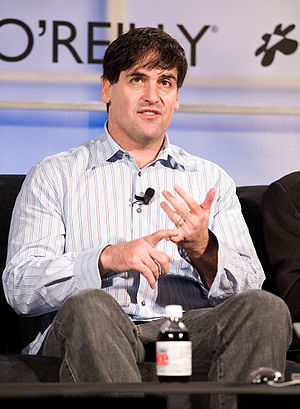 Image via Wikipedia
Image via Wikipedia
I read an interesting post from Mark Cuban today on the problems of startup success using a free model. Back in the 90's when I was cutting my teeth around web/tech, the mantra we heard from VC's was "get big fast", and "eyeballs are everything", and "don't worry about making money, we'll fund you", and "you can get a higher valuation if you're NOT producing revenue".
All of these statements seemed odd to me. I do understand the value of first-mover advantage, but what are we in business for if we can't focus on providing value that people will pay for?
Mark argues that the company that is successful on being free will feel the need to continue to build bigger infrastructure and hire more people because the next 'free' thing is right around the corner. This means they never learn to be lean and protect themselves in downturns. In order to stay competitive with the next free thing, they'll spend too much money and lessen their ramp time.
to stay at the top. The more success you have, the more important it is
to management to remain successful. The more important remaining
successful is to management, the more money they will spend, the more
chances they will take, the more infrastructure they will build, the
more people they will hire. All of the things that will prevent them
from staying lean, mean and flexible. All of the things that distract
them from innovating within their core competency."
I live in downtown San Diego, and across the street from me, a new restaurant just opened. Based on a reliable friend in the local restaurant scene, I know they spent a total of $2.5 to $3 million to open the doors. This is about the same amount of money raised by a web quasi social networking company I'm familiar with. The difference is that starting day one, the restaurant had customers lined up willing to pay $50 – $75 for it's service. The web company, now two rounds of financing and three years into it, is still not charging for their service, and I question whether they have anything that people will actually pay for. Now that they've done a series A and B, I doubt if the founding team even owns the majority of their company. Thus, the entrepreneur has locked himself into a job.
(As a side note, I absolutely believe in raising money for growth. Once a model has been proven, it makes sense to accelerate the earnings, and normally, this takes additional capital. The difference is that at this stage, the company has been given the task of figuring out customer demand and iterating their model quickly. Those that succeed are able to find the model that works and begin to place their efforts towards amplifying their processes.)
I just have a different way of looking at things. I speak to entrepreneurs all the time that want in the game simply to cash out. There's more thought to the exit than there is to service needed to provide the exit. It's rare that I hear them say, "here's the value I provide to my most loyal customer". Just like in the 90's, it doesn't make sense to me.
Unless you are starting a company for the sole purpose of flipping it, it is my belief that the company should have a clear revenue model rolled out soon after launch. This means you may have to build slower and have to execute on a customer-centric strategy. The revenue generated will give you a longer launch-pad and the company that you've toiled and sacrificed for will remain in the hands of the people most passionate about its success.

![Reblog this post [with Zemanta]](https://www.stevencox.com/https://www.stevencox.com/wp-content/themes/wp-prosper-20/images/reblog.png)
Wow I think this article’s topic is very entertaining. Keep up the good work!